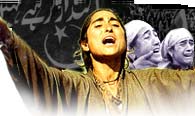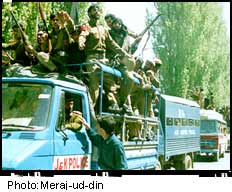

 |
 |
|
HOME | NEWS | SPECIALS | BLOOD IN THE SNOW | BITTER MEMORIES

Even before the Rubaiya incident, people who knew Kashmir had sensed there was major trouble. The undercurrents were there for all to see. But somehow, somewhere people missed out on those signs. The result was 1989. Suddenly things exploded. The main traffic to Pakistan-occupied Kashmir started in 1990. But people had been crossing over even before. Somehow things were not properly taken care of at the border. There was a huge number of youths going across. Once they started returning with weapons the situation changed. The Jammu and Kashmir police had started anti-militancy operations way back in 1988 when nobody even knew boys were crossing over. By 1989 all the boys had been identified. And 90 per cent of those who returned were arrested. Not by the CRPF or the BSF or the army, but by the JK police. The next year saw a sudden decline in the functioning of the police. It wasn't just because militants were targeting police officials. There was another reason: some people in the state government wanted to sideline the JK police. We are yet to comprehend why they wanted that. Senior police officers would get killed and nobody cared a damn! Our boys would get blown to pieces and the government would not react! We were treated very shabbily. Despite the fact that it was we who told India, look here, these boys are going across. When nobody believed us we caught them. We recovered the first Kalashnikov rifle in India. Nobody had seen that rifle before. In fact, it was the arrested militants who told us, this is how it is used, this is how it is dismantled... But we were treated shabbily. Thus, a force that was functioning, a force that arrested the top leadership of the damned militant groups was sidelined. Once you sideline the police the bad elements in the department get a chance to exploit the situation. The ISI utilised that in a masterly manner. So the JK police got demoralised. From 1990 to 1993 we were nowhere. We were entrusted only with the job of getting post-mortems conducted, dispersing processions or attending to VIPs. During 1988-89 the locals were coming to us with information. That was how the police were able to apprehend so many militants. But after the Rubaiya incident, probably because people started feeling that the Government of India can be pressurised into doing something about Kashmir, they started supporting militants. Then came the phase when Mr Jagmohan took over as governor. The situation worsened. The first six months of 1990 changed the total pattern of militancy. A kind of euphoria got created, which was not handled in a manner that could have restricted the damage. In 1990, definitely yes, people had the notion that Kashmir would soon be independent. It took them more than two-three years to realise that it wouldn't be. Had the fallout of Moulvi Farooq's killing been handled properly, the course of events would have changed. There are some people who believe that militancy would have died that day if we had exploited the situation. You see, Kashmiris are emotional people. When (Zulfikar Ali) Bhutto was hanged, the Jamaat-e-Islami cadres were targeted in the valley in such a manner that most of them lost their property. They survived only because the police intervened. The people were reacting the same way the day Maulavi was killed. A huge procession was shouting slogans against militants. Their next step would have been targeting the militants. But then there was firing. People were killed. Had it not been for that incident the people would have taken care of the militants themselves. The Kashmiri knew who the killers were. He would have taken care of them the very same day. In 1990 the boys were new. Militancy was in its nascent stage. They could be caught quite easily. But by 1993 things were different. They gave us tough time. They gave us hard encounters. Their resistance level was quite high. They were hardened and much better equipped. By 1994 the JK police was back in action. The Special Task Force, meant exclusively for counterinsurgency, came into being. They have the best record against militants today, better than the army or the paramilitary forces. Yes, I have taken part in many encounters. Luckily, I survived. You don't feel good about shooting a person. But when you lose a boy it feels worse. These are the people who are closer to you than your own family. They are the ones with whom you share life and death. Losing a boy is the worst thing that can happen to you. It kills you. Interviewed by Chindu Sreedharan
The Kashmiris
The ex-militants |
|||||||||||||||||||||||||||||||||||||||||